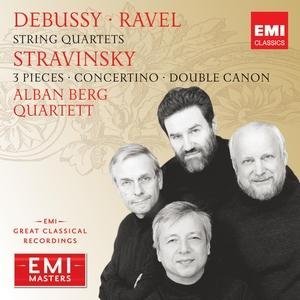 |
 |
|


alternatively
CD: AmazonUK
AmazonUS
|
Claude DEBUSSY
(1862-1918)
String Quartet (1893) [23:19]
Maurice RAVEL (1875-1937)
String Quartet (1904) [28:37]
Igor STRAVINSKY (1882-1971)
Three Pieces for String Quartet (1915) [6:24]; Concertino (1920)
[6:06]; Double Canon (1959) [1:24]
 Alban Berg Quartett (Günther Pichler, Gerhard Schulz (violins);
Thomas Kasuka (viola), Valentin Erben (cello))
Alban Berg Quartett (Günther Pichler, Gerhard Schulz (violins);
Thomas Kasuka (viola), Valentin Erben (cello))
rec. 1984 (Debussy; Ravel), 1983 (Stravinsky), Evangelical Church,
Seon, Switzerland
 EMI CLASSICS MASTERS 9 65939 2 [66:20] EMI CLASSICS MASTERS 9 65939 2 [66:20] 
|
|
|
The Debussy and Ravel quartets are frequent partners on disc,
and rightly so in light of their similarities. These performances
from the Alban Berg Quartett, however, seem more determined
to point up the differences. The first movement of the Debussy
is searching, sometimes trembling and features remarkably powerful
bass figurations from the cello and viola. The scherzo moves
purposefully over constantly swirling pizzicato figures in the
lower instruments while the slow movement feels as though it
has been caught between two worlds of peace. The Ravel, on the
other hand, seems much more architectural: the first movement,
in particular, feels densely layered while the slow movement
is altogether more angular than the Debussy. The slow movement,
ghostly at times, is full of restraint and introspection, while
the finale is vigorously worked, even argumentative at times.
The Alban Berg Quartett’s performances have been around
for over twenty years now and resurfaces on the EMI Masters
label as a classic. It has had to deal with stiff competition
since then, most notably from the Gramophone Award winning performance
from the Ébène Quartet. In the light of these
later performances the Alban Berg can sometimes feel overly
polished. True, there is not much in the way of spontaneity
in these performances and they can seem at times rarefied versions
of these works. In spite of this I found the finesse of the
playing more of an asset than a problem and, while they won’t
please everyone, they certainly pleased me.
The Stravinsky coupling is excellent. The players get under
the skin of the - remarkably diverse - Three Pieces very
effectively and the Concertino feels spidery and unsettling.
For all its brevity the Double Canon sounds remarkably moving.
At budget price and in splendid sound it’s hard to see
how anyone could be disappointed with this.
Simon Thompson
|
|















